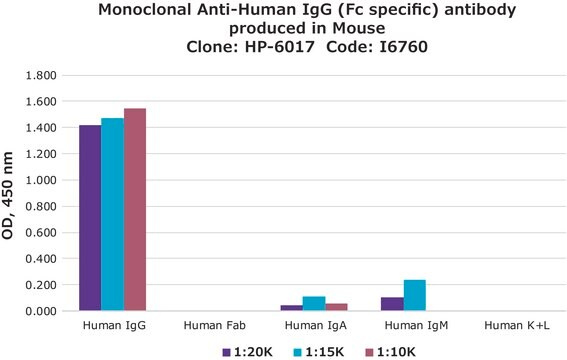401393
Goat Anti-Rabbit IgG, H & L Chain Specific Peroxidase Conjugate
liquid, Calbiochem®
Sign Into View Organizational & Contract Pricing
All Photos(1)
About This Item
UNSPSC Code:
12352203
Recommended Products
biological source
goat
Quality Level
antibody form
affinity isolated antibody
antibody product type
secondary antibodies
clone
polyclonal
form
liquid
contains
0.02% thimerosal as preservative
manufacturer/tradename
Calbiochem®
storage condition
do not freeze
isotype
IgG
shipped in
wet ice
storage temp.
2-8°C
target post-translational modification
unmodified
Related Categories
General description
Adsorbed against bovine, horse, human, and mouse serum proteins.
Immunoaffinity purified goat polyclonal antibody adsorbed against bovine, horse, human, and mouse serum proteins and conjugated to horseradish peroxidase. Recognizes rabbit IgG, heavy and light chains.
This Goat Anti-Rabbit IgG, H & L Chain Specific Peroxidase Conjugate is validated for use in Enzyme Immunoassay, Immunoelectrophoresis for the detection of Rabbit IgG, H & L Chain Specific.
Immunogen
Rabbit
Application
Enzyme Immunoassay (1:10,000)
Immunoelectrophoresis (see comments)
Immunoelectrophoresis (see comments)
Warning
Toxicity: Standard Handling (A)
Physical form
In 10 mM PBS, 0.5 mM EDTA, 10% mannose, 2% sucrose, 1% BSA, pH 7.6.
Other Notes
Monospecific for rabbit IgG, heavy and light chains, as determined by immunoelectrophoresis against normal rabbit serum. Cross-reactivity with normal bovine, horse, human, and mouse serum: <2% by direct solid phase immunoassay. Variables associated with assay conditions will dictate the proper working dilution.
Legal Information
CALBIOCHEM is a registered trademark of Merck KGaA, Darmstadt, Germany
Disclaimer
To comply with ban of sale of mercury-added products required by The Interstate Mercury Education and Reduction Clearinghouse (IMERC), this product is prohibited to be sold in the following US states: Rhode Island and Connecticut.
Not finding the right product?
Try our Product Selector Tool.
Storage Class Code
12 - Non Combustible Liquids
WGK
WGK 2
Flash Point(F)
Not applicable
Flash Point(C)
Not applicable
Certificates of Analysis (COA)
Search for Certificates of Analysis (COA) by entering the products Lot/Batch Number. Lot and Batch Numbers can be found on a product’s label following the words ‘Lot’ or ‘Batch’.
Already Own This Product?
Find documentation for the products that you have recently purchased in the Document Library.
Mariana Santos et al.
Scientific reports, 9(1), 16150-16150 (2019-11-07)
Parkinson disease (PD) is the second most common neurodegenerative disorder. Most cases of PD are sporadic, while 5-10% have a known genetic basis. Variants in the PARK2 gene are the most frequent cause of autosomal recessive juvenile-onset PD. PARK2 encodes
Yotam Blech-Hermoni et al.
Developmental dynamics : an official publication of the American Association of Anatomists, 245(8), 854-873 (2016-05-05)
CUG-BP, Elav-like family member 1 (CELF1) is a multifunctional RNA binding protein found in a variety of adult and embryonic tissues. In the heart, CELF1 is found exclusively in the myocardium. However, the roles of CELF1 during cardiac development have
Yotam Blech-Hermoni et al.
PloS one, 11(2), e0149061-e0149061 (2016-02-13)
CUG-BP, Elav-like family member 1 (CELF1) is a highly conserved RNA binding protein that regulates pre-mRNA alternative splicing, polyadenylation, mRNA stability, and translation. In the heart, CELF1 is expressed in the myocardium, where its levels are tightly regulated during development.
Eric Lieberman Greer et al.
Cell research, 26(2), 229-238 (2015-12-23)
Complex organismal properties such as longevity can be transmitted across generations by non-genetic factors. Here we demonstrate that deletion of the C. elegans histone H3 lysine 4 dimethyl (H3K4me2) demethylase, spr-5, causes a trans-generational increase in lifespan. We identify a
Umberto Rodella et al.
Disease models & mechanisms, 10(5), 597-603 (2017-01-10)
The neuromuscular junction is exposed to different types of insult, including mechanical trauma, toxins and autoimmune antibodies and, accordingly, has retained through evolution a remarkable ability to regenerate. Regeneration is driven by multiple signals that are exchanged among the cellular
Our team of scientists has experience in all areas of research including Life Science, Material Science, Chemical Synthesis, Chromatography, Analytical and many others.
Contact Technical Service


